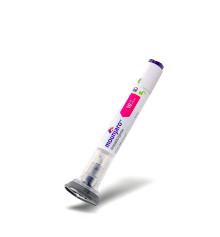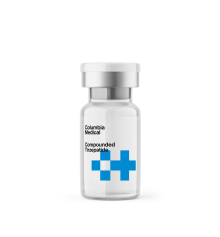Name brand semaglutide carries a Black Box Warning. Semaglutide is not recommended in individuals with a history of medullary thyroid carcinoma, a
family history of such, or in patients with multiple endocrine neoplasia syndrome type 2. Do not
take it if you have ever had thyroid cancer. In studies with rodents, semaglutide caused
thyroid
tumors, including thyroid cancer; it is not known if it will cause thyroid tumors or cancer
in
humans. Please notify your doctor ASAP if you develop trouble swallowing, hoarseness, a lump
or
swelling in your neck, or shortness of breath.
If you experience a medical emergency, call 911 or go to the nearest emergency room.
Tell your health care provider about your medical history prior to taking semaglutide.
Avoid alcohol while taking this medication. If you're taking diabetes medications, please
discuss this with your prescribing doctor before starting semaglutide, as your diabetes
medications may need to be adjusted as you lose weight.
Use adequate contraception while taking this medication. Do not take this medication if
pregnant, trying to get pregnant or breastfeeding. If you plan to become pregnant, this
medication needs to be stopped at least 2 months before trying. This medication may cause
fetal
harm.
Notify your doctor if you have kidney, liver, or pancreas problems.
Stop using semaglutide and call your health care provider immediately if you have severe
stomach
or abdomen pain that will not go away, with or without vomiting.
Stop using semaglutide and get medical help right away if you have any symptoms of a serious
allergic reaction, including swelling of your face, lips, tongue, or throat; problems
breathing
or swallowing; severe rash or itching; fainting or feeling dizzy; or very rapid heartbeat.
Serious hypersensitivity reactions (e.g., anaphylaxis and angioedema) have been reported.
Discontinue semaglutide if suspected and promptly seek medical advice.
Show more...
...Hide
Doctor Consultation: Before starting a weight loss program with semaglutide, it is essential
to
consult your doctor. This is especially important if you have any chronic conditions,
thyroid
problems, glaucoma, or other medical conditions.
Allergy: If you are allergic to semaglutide or any of the ingredients in the medication, do
not
use it.
Pregnancy and Breastfeeding: Semaglutide is not recommended for pregnant or breastfeeding
women.
If you are pregnant, planning a pregnancy, or breastfeeding, discuss this with your doctor.
Show more...
...Hide
Common: Headache, nausea, vomiting, constipation, diarrhea, dry mouth, fatigue, drowsiness,
decreased appetite.
Serious: Signs of pancreatitis (severe abdominal pain, nausea, vomiting, rapid heartbeat),
thyroid problems, glaucoma, psychiatric disorders (depression, anxiety, confusion).
If you experience any serious side effects, seek medical attention immediately.
Show more...
...Hide
Inform your doctor about all medications you are taking, including over-the-counter drugs.
Semaglutide may interact with other medications, which may affect their efficacy or cause
side
effects.
Show more...
...Hide
Name brand semaglutide carries a Black Box Warning.
Semaglutide is not recommended in individuals with a history of medullary thyroid carcinoma,
a
family history of such, or in patients with multiple endocrine neoplasia syndrome type 2. Do
not
take it if you have ever had thyroid cancer. In studies with rodents, semaglutide caused
thyroid
tumors, including thyroid cancer; it is not known if it will cause thyroid tumors or cancer
in
humans. Please notify your doctor ASAP if you develop trouble swallowing, hoarseness, a lump
or
swelling in your neck, or shortness of breath.
If you experience a medical emergency, call 911 or go to the nearest emergency room.
Tell your health care provider about your medical history prior to taking semaglutide.
Avoid alcohol while taking this medication. If you're taking diabetes medications, please
discuss this with your prescribing doctor before starting semaglutide, as your diabetes
medications may need to be adjusted as you lose weight.
Use adequate contraception while taking this medication. Do not take this medication if
pregnant, trying to get pregnant or breastfeeding. If you plan to become pregnant, this
medication needs to be stopped at least 2 months before trying. This medication may cause
fetal
harm.
Notify your doctor if you have kidney, liver, or pancreas problems.
Stop using semaglutide and call your health care provider immediately if you have severe
stomach
or abdomen pain that will not go away, with or without vomiting.
Stop using semaglutide and get medical help right away if you have any symptoms of a serious
allergic reaction, including swelling of your face, lips, tongue, or throat; problems
breathing
or swallowing; severe rash or itching; fainting or feeling dizzy; or very rapid heartbeat.
Serious hypersensitivity reactions (e.g., anaphylaxis and angioedema) have been reported.
Discontinue semaglutide if suspected and promptly seek medical advice.
Show more...
...Hide
Important: Before starting treatment, it is essential to consult your doctor. The medication
is
intended for adults only. Do not take semaglutide if you are pregnant, planning a pregnancy,
or
breastfeeding.
Do not take semaglutide if you have an increased sensitivity to semaglutide or any of the
excipients in the medication.
Do not stop taking the medication on your own. Any changes in dosage should be coordinated
with
your doctor.
Regularly undergo medical examinations to monitor your health condition.
Show more...
...Hide
Semaglutide may cause the following side effects:
Common: nausea, vomiting, constipation, diarrhea, headache, fatigue, decreased blood
pressure.
Rare: allergic reactions, including rash, itching, swelling of the face, tongue, or throat.
If you experience serious side effects, seek medical attention immediately.
Show more...
...Hide
Semaglutide may interact with other medications, including:
Blood sugar-lowering medications (e.g., metformin, glyburide).
Thyroid function medications (e.g., levothyroxine).
Kidney function medications (e.g., ACE inhibitors, angiotensin II receptor blockers).
Inform your doctor about all medications you are taking, including over-the-counter drugs.
Show more...
...Hide
Name brand semaglutide carries a Black Box Warning.
Semaglutide is not recommended in individuals with a history of medullary thyroid carcinoma,
a
family history of such, or in patients with multiple endocrine neoplasia syndrome type 2. Do
not
take it if you have ever had thyroid cancer. In studies with rodents, semaglutide caused
thyroid
tumors, including thyroid cancer; it is not known if it will cause thyroid tumors or cancer
in
humans. Please notify your doctor ASAP if you develop trouble swallowing, hoarseness, a lump
or
swelling in your neck, or shortness of breath.
If you experience a medical emergency, call 911 or go to the nearest emergency room.
Tell your health care provider about your medical history prior to taking semaglutide.
Avoid alcohol while taking this medication. If you're taking diabetes medications, please
discuss this with your prescribing doctor before starting semaglutide, as your diabetes
medications may need to be adjusted as you lose weight.
Use adequate contraception while taking this medication. Do not take this medication if
pregnant, trying to get pregnant or breastfeeding. If you plan to become pregnant, this
medication needs to be stopped at least 2 months before trying. This medication may cause
fetal
harm.
Notify your doctor if you have kidney, liver, or pancreas problems.
Stop using semaglutide and call your health care provider immediately if you have severe
stomach
or abdomen pain that will not go away, with or without vomiting.
Stop using semaglutide and get medical help right away if you have any symptoms of a serious
allergic reaction, including swelling of your face, lips, tongue, or throat; problems
breathing
or swallowing; severe rash or itching; fainting or feeling dizzy; or very rapid heartbeat.
Serious hypersensitivity reactions (e.g., anaphylaxis and angioedema) have been reported.
Discontinue semaglutide if suspected and promptly seek medical advice.
Show more...
...Hide
Important: Before starting treatment, it is essential to consult your doctor. The medication
is
intended for adults only. Do not take semaglutide if you are pregnant, planning a pregnancy,
or
breastfeeding.
Do not take semaglutide if you have an increased sensitivity to semaglutide or any of the
excipients in the medication.
Do not stop taking the medication on your own. Any changes in dosage should be coordinated
with
your doctor.
Regularly undergo medical examinations to monitor your health condition.
Show more...
...Hide
Semaglutide may cause the following side effects:
Common: nausea, vomiting, constipation, diarrhea, headache, fatigue, decreased blood
pressure.
Rare: allergic reactions, including rash, itching, swelling of the face, tongue, or throat.
If you experience serious side effects, seek medical attention immediately.
Show more...
...Hide
Semaglutide may interact with other medications, including:
Blood sugar-lowering medications (e.g., metformin, glyburide).
Thyroid function medications (e.g., levothyroxine).
Kidney function medications (e.g., ACE inhibitors, angiotensin II receptor blockers).
Inform your doctor about all medications you are taking, including over-the-counter drugs.
Show more...
...Hide

























